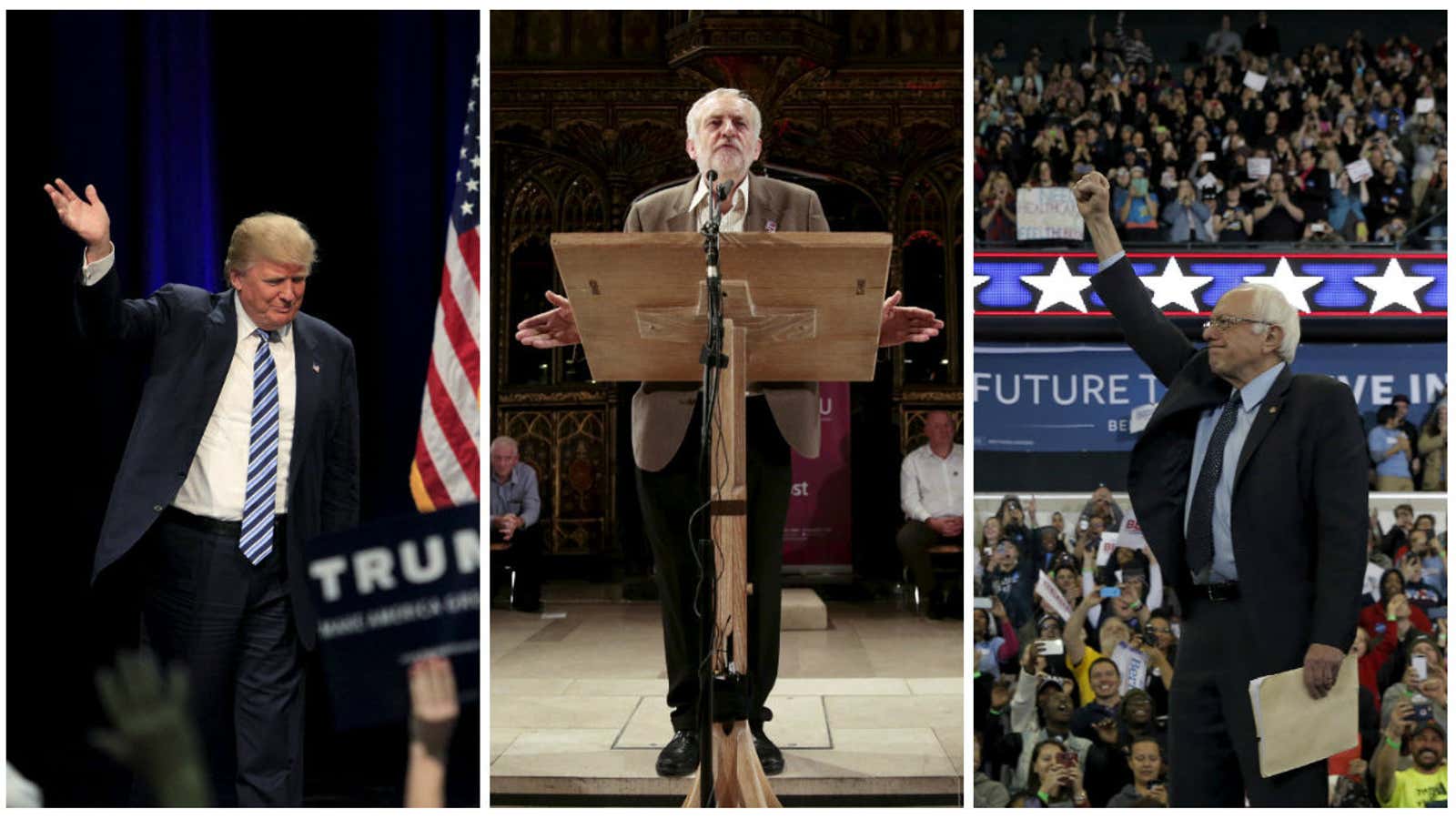His words have not been scripted or prepared for the press; he speaks from the heart.
It’s now clear to every voter that [he] is nothing but himself.
No Bullshit. Unvarnished opinion and beliefs.
One of these statements recently was made about Donald Trump, the man causing upset in the race to become the Republican presidential candidate. Another was made in reference to Bernie Sanders, the candidate causing similar upset among the Democrats. Another referred to Jeremy Corbyn, leader of the British Labour party. But which statement refers to which politician? It is, of course, impossible to tell.
Despite the radically different stances of these candidates on all kinds of issues, the statements about them are entirely interchangeable. They all refer to a single quality, taken by many to be a great asset in political life. All of these candidates are considered “authentic.”
We are constantly reminded about the authenticity of Bernie Sanders. Polls suggest that Donald Trump is the “authenticity candidate” of 2016. Authenticity is apparently the one key trait that secured the Labour leadership election for Corbyn.
Even those who don’t buy into what these candidates are selling seem obsessed with authenticity. Don’t believe Trump or Sanders, we are warned—there is no such thing as an authentic candidate in politics.
Is this the real life?
Whether people are skeptical or enthusiastic about authenticity, it’s in the air right now, and with Trump and Sanders coming out on top of the New Hampshire primary, it’s likely to remain there. But what kind of quality is it? Is it a political idea at all? And if so, where does it come from?
When people talk about Trump, Corbyn, and Sanders, authenticity seems to be about personal character. These men have the courage to reveal their true selves to the world. Authenticity of this sort is often framed as a backlash against something that has gone wrong. These three men offer an alternative to a political establishment that has become aloof, out of touch, managerial, and even corrupt.
But authenticity is never just about character. It is also about enabling authentic lives for the collective. Trump’s version of that idea is to resurrect the spirit of the authentic American entrepreneur. For Bernie Sanders, it is about bringing the true wishes of ordinary Americans into government policy.
Whatever the solution, the authenticity of the leader is seen as the key to delivering an authentic life for everyone else.
Who gets to be authentic?
This idea is far from new. Calls for authenticity have shaped the emergence of democratic politics from the beginning. We have long sought “authentic” political representation, either by reform or by revolution, to free society from the rule of self-serving and unrepresentative elites.
If we ask how we recognize this quality, the answer is that it is accessed via intuition, rather than rational analysis. The US Declaration of Independence of 1776 famously starts with the words: “We hold these truths to be self-evident.”
Since then, authenticity has been invoked across the political spectrum. For a while, it became a deeply unfashionable term. National Socialism had much to do with this. Hitler’s Mein Kampf, part autobiography, part political program, suggested that parliamentary politics was by its very nature corrupt, and advocated a new politics that grew organically from the spirit of the people, or the race. Its leader was not to be an “expert,” but an authentic man of the people.
This had long-lasting effects. In a famous essay, the Marxist German philosopher Theodor Adorno suggested the “jargon of authenticity“ was the essence of fascism. And even today, the majority of scholars regard the idea as a hoax.
But authenticity was never the preserve of fascists. Half a century before Hitler, German liberals argued that national parliamentary politics was both ineffectual and distorted by interest and ideology. They, on the other hand, achieved real progress through “anti-politics,” working in local municipalities to solve the problems that really affected people’s lives, from railway building to public sanitation.
Similarly, authenticity has long featured in the political programs and texts of the left, identifying capitalism as the root of inauthentic lives. The world of advertising and corporate branding, it is claimed, reduces human beings to mere consumers.
In attacking the ills of the present, authenticity invokes tradition, and taps into the shared identity of a community. That can be a national community, as for the contemporary far right, or it can be the idea of “Western civilization” that needs protecting, as anti-Islamist movement Pegida advocates. But authentic traditions are also vital to how progressives imagine politics. For the Left, the community of “class” shapes political behavior. Marxists and many trade unionists argue that only political representatives who speak the authentic language of the working class can be regarded as its credible representatives.
All such claims are open to contestation. So, however, are other political values we hold dear, such as freedom and justice. Few ideologies in the modern world do not invoke these terms.
However skeptical we may be of a particular people’s understanding of authenticity, the yearning for it is real. And it is an enduring political passion. The “anti-politics” of authenticity is not something that comes from outside of politics, it is itself a political idea. Simply to unmask the authenticity con is not enough.
There is a reason why many voters see Corbyn, Trump, and Sanders as different from, and preferable to, “conventional” politicians. If it is not always clear what authenticity means, or should mean, then this is precisely because it is a contestable political concept. There is no “anti-politics,” but there are multiple ways of being political.
